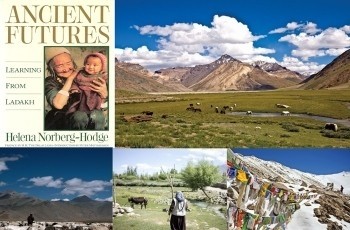シンクタンクからの眼 2022年7月12日
古き未来-私たちが見失った幸せの形 The Ancient Future–The Lost Shape of Our Happiness

古き未来-私たちが見失った幸せの形 The Ancient Future–The Lost Shape of Our Happiness
『Ancient Futures』(日本語版タイトル『懐かしい未来』)を初めて手に取ったとき、私はそれが過去の暮らしや伝統文化の価値を再発見し、現代に生きる私たちへ安らぎを与える本だと思った。しかし、読み進めるうちに、それが単なる郷愁ではなく、未来のあり方を深く考えさせる一冊であることに気づいた。我々は物質的な豊かさを追求してきたが、それが必ずしも幸せにつながるとは限らない。本当に大切なのはなんなのか。本書は、私たちが見落としてきた本質的な価値について問いかけてくる。(『Ancient Futures: Learning from Ladakh』Helen Norberg-Hodge著)
ラダックは「小さなチベット」とも呼ばれる、インド北部のヒマラヤ高原に位置する地域である。千年以上にわたり、厳しい自然環境の中で独自の共同体文化を守り続けてきた。産業化の影響を受けず、自給自足の経済と助け合いを基盤に、シンプルながらも満ち足りた暮らしを営んでいた。彼らにとって「豊かさ」とは、物質的な所有ではなく精神的な満足に根ざしたものだった。競争よりも協力、消費よりも分かち合いを大切にしながら生きていた。
このラダックの社会を人生をかけて観察したのが、スウェーデン出身の言語学者であり環境運動家でもあるヘレナ・ノルベルグ=ホッジだ。彼女は1975年に研究者としてラダックを訪れ、その後16年間、人々と共に暮らしながら彼らの文化の本質を学んでいった。初めは西洋の産業社会こそが理想的な未来だと信じていた彼女だったが、物質的に豊かでなくとも穏やかに暮らすラダックの人々を見て、幸福とは何かを根本から問い直すことになる。貨幣経済に縛られることなく、互いに助け合いながら生きる彼らの姿は、現代社会の価値観とは対照的だった。
自然環境が過酷であっても、ラダックの人々は不満を抱くことなく、助け合いながら日々を過ごしていた。畑を耕し、収穫物を分け合い、手作りの家に住みながら、共同体の中で生きることに深い満足感を見出していた。現代社会のように極端に分業化され、効率を最優先する世界とは異なり、彼らの暮らしには調和と幸せがあった。しかし、このラダックにも近代化の波が押し寄せる。外部との接触が増え、西洋式の開発と産業化が進む中で、社会のバランスが崩れ始める。かつて存在しなかった「貧困」という概念が生まれ、経済格差が拡大していった。金銭を持つ者と持たざる者の違いが明確になり、競争が社会に入り込み、共同体の結束が弱まっていった。
著者はこうした変化を「発展」とは考えず、それを文化の侵食であり、人々の精神的な豊かさを奪う危険な現象であると警鐘を鳴らす。開発とは一方的に押し付けるものではなく、地域ごとの価値観を尊重しながら行われるべきではないか。ラダックの伝統社会には、現代が失いつつある「内面的な豊かさ」があり、それを学ぶことが未来を築く上で重要だと著者は主張する。かつてのラダックでは、人々は温かい心を持ち、外部の影響を受けずとも満足して生きていた。しかし、近代化が進むにつれて、不安や不満が広がり、幸福は次第に遠ざかっていった。
ラダックにはもともと犯罪という概念がほとんどなく、浪費や環境破壊とも無縁だった。家族や共同体のつながりが人々の暮らしの中心にあり、貨幣経済が社会の基盤ではなかった。しかし、近代化が進むにつれてその調和は崩れ、伝統的な価値観は次第に薄れていく。これはラダックだけの問題ではなく、現代社会全体が直面している普遍的な課題ではないだろうか。資本主義や情報化社会の進展は、本当に私たちの幸福を増やしているのか、改めて考えさせられる。
本の中で登場する「振り付けのないダンス」という表現は、ラダックの人々の自由で自然な生き方を象徴している。彼らは誰かに指示されることなく、自然のリズムに合わせて暮らしていた。しかし、現代を生きる私たちはどうだろう。時間に追われ、競争に駆り立てられ、常に何かと比較しながら生きている。果たして、私たちには本当の自由があるのだろうか。ラダックの生き方は、幸福とは何かを私たちに根本から問い直させる。
この本が伝えるメッセージは明確だ。人間の本質的な欲求や価値観を大切にし、自然環境と伝統文化を守ることこそが、持続可能な未来へとつながる。競争や消費ではなく、協力と調和の価値を取り戻すことで、私たちはより豊かで満ち足りた生き方ができるのではないか。著者はラダックの変化を通じて、私たちが見落としてきたものを問い直し、現代社会が進むべき方向を考えさせる。
『Ancient Futures(古き未来)』は、単なる文化人類学的な記録ではない。過去の伝統の中に、これからの未来を見出すことができるのだと静かに語りかける。そして、それこそが私たちが今、取り戻すべき価値なのかもしれない。
(玉川きょうさい、Ph.D./Prof.)
The Ancient Future – The Lost Shape of Our Happiness
When I first picked up “Ancient Futures”, I thought it was a book that rediscovered the value of past lifestyles and traditional culture, offering comfort to those of us living in the modern world. However, as I read on, I realized that it was not merely about nostalgia but a book that profoundly makes us rethink the future. We have pursued material wealth, but that does not necessarily lead to happiness. What is truly important? This book questions the essential values we have overlooked.(“Ancient Futures: Learning from Ladakh” by Helena Norberg-Hodge)
Ladakh, known as the "Little Tibet," is located in the highlands of the Himalayas in northern India. For over a thousand years, it has maintained its unique communal culture despite its harsh natural environment. Without the influence of industrialization, Ladakh built a simple yet fulfilling way of life based on self-sufficiency and mutual support. To them, wealth was not about material possessions but rather about spiritual contentment. They valued cooperation over competition and sharing over consumption.
The person who dedicated her life to observing this society was Helena Norberg-Hodge, a Swedish linguist and environmental activist. She first visited Ladakh in 1975 as a researcher and spent the next 16 years living among its people, learning the essence of their culture. Initially, she believed that Western industrial society was the ideal future for humanity. However, as she observed the Ladakh-who, despite lacking material wealth, lived peacefully and contentedly-she began to fundamentally question the definition of happiness. Free from the constraints of money, they lived by supporting one another, offering a stark contrast to modern societal values.
Even in the face of harsh environmental conditions, the Ladakh expressed no dissatisfaction. They cultivated their land, shared their harvests, built handmade homes, and found deep satisfaction in living within their community. Unlike modern societies, which prioritize extreme specialization and efficiency, their way of life was centered on balance and happiness. However, modernization eventually reached Ladakh. As external contact increased, Western-style development and industrialization began to take hold, disrupting the delicate balance of their society. Concepts such as "poverty," which had never previously existed, emerged, and economic disparities widened. Those with money were set apart from those without, competition infiltrated society, and the bonds of the community weakened.
The author does not view these changes as "progress." Instead, she sees them as a form of cultural erosion that threatens people’s spiritual wealth. She warns against the imposition of development and argues that true progress should respect the unique values of each region. The traditional Ladakhi society embodies an "inner richness" that modern civilization is rapidly losing, and learning from it is crucial for shaping a better future. In the past, Ladakh lived with warmth and contentment, untouched by external influences. However, as modernization advanced, anxiety and dissatisfaction spread, and happiness gradually faded.
Ladakh was once a society where crime was almost nonexistent, wastefulness and environmental destruction were unheard of, and family and community ties were at the heart of everyday life. But as the monetary economy took hold, this harmony began to erode, and traditional values weakened. This issue is not unique to Ladakh—it is a universal challenge facing modern society. Has the advancement of capitalism and the information age truly made us happier? This book compels us to reconsider that question.
One phrase in the book, "a dance without choreography," perfectly captures the Ladakh’ way of life. They lived in sync with the natural rhythm, without external direction or constraint. But what about us? Constantly pressed for time, driven by competition, and always comparing ourselves to others—do we truly have freedom? The way the Ladakh live forces us to rethink the very essence of happiness.
The message of this book is clear: respecting fundamental human needs and values while preserving nature and traditional cultures is the key to a sustainable future. Instead of pursuing competition and consumption, we must restore the values of cooperation and harmony. By doing so, we can achieve a richer and more fulfilling way of life. Through Ladakh’s transformation, the author challenges us to reflect on what we have lost and reconsider the path modern society should take.
Ancient Futures is not merely an anthropological record. It gently reminds us that within the traditions of the past, we can find the blueprint for the future. And perhaps, this is the very value we need to reclaim today.
(K.S. Tamagawa, Ph.D./Prof.)




